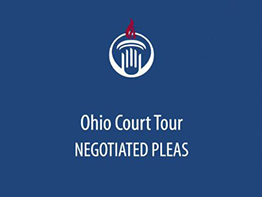Pleas
During your initial appearance, you will be asked to enter a plea. Your plea is your formal response to the charges against you. When you are asked to enter your plea, your answer will determine the next steps in the legal process. You should talk to a lawyer before entering a plea so that you understand the consequences of each option.
|
Plea Options |
What you are saying to the court |
|
Guilty |
I admit that I am guilty of the offense(s) and the facts are correct as described in the complaint |
|
Not guilty |
I am not guilty of each and every element of the offense(s) charged against me |
|
No contest |
I do not admit my guilt for the offense(s), but I admit that the facts in the complaint are true and I accept the consequences of those facts |
|
Not guilty by reason of insanity |
When the offense was committed, I was suffering from a mental disorder and I did not understand what I was doing was wrong |
If you refuse to enter a plea, the judge will enter a plea of “not guilty” for you. You can enter most pleas orally. Not guilty by reason of insanity pleas must be submitted in writing.
Pleading guilty or no contest
Pleading guilty or no contest is a serious decision that can have a major effect on you. For this reason, the judge will only accept your plea under certain conditions.
- The judge will not accept your plea unless he or she is convinced that you understand the consequences of the plea. The judge will explain them to you.
- The judge will also want to know that you are entering this plea voluntarily.
- The judge will only accept a plea of guilty or no contest if you make it clear, in writing, that you do not want a lawyer.
If the judge is satisfied that the conditions are met, you will be sentenced or you will be directed to the probation department for a pre-sentence investigation.
Whether or not you have a lawyer, you have the right to present any information that you want the judge to consider or any reasons to lessen your punishment during your sentencing hearing. The judge can refer you to probation for a pre-sentence interview and sentence you at a later date or sentence you right after you plead no contest or guilty.
What is the difference?
The pleas are similar except a plea of no contest does not admit guilt for the offense while admitting the facts and elements. Guilty pleas admit guilt and accept all of the facts and elements in the charges.
The benefit of a no-contest plea (when you admit the facts, but not your guilt) is that prevents the plea from being used against you in any later civil or criminal proceeding.
Example: If George rear-ends someone, a police officer might give George a ticket. George might also expect a lawsuit in court for the damages he caused. If George goes to court and pleads guilty for the traffic offense, the person he rear-ended can use his admission of guilt in court against him. However, if George pleads no contest, the driver he rear-ended cannot use that as an admission of guilt in court.
Pleading not guilty
If you plead not guilty, the prosecutor has to prove your guilt in court. The court will set a time for further proceedings, such as a pretrial conference or trial.
In minor misdemeanor cases, the court may schedule a pretrial conference or trial. In most other cases, the judge will schedule a pretrial conference.
If you are being held in jail, the magistrate or judge may set the terms for your release. You may have to post bail.
Negotatiated Settlements
Most criminal cases never go to trial. Instead, the state and defense attorney reach a negotiated settlement. They agree to a plea that settles the case without going to trial. Sometimes, these are called negotiated pleas or plea bargains.
A negotiated settlement may involve dismissing some or all of the charges in exchange for a guilty plea to other charges. Or, it may be that the state agrees to a guilty plea for a lesser charge, if they can make certain sentencing recommendations to the judge.
All plea agreements are reviewed by the judge. The judge must decide if the negotiated settlement is fair and just and whether the agreement is acceptable.


